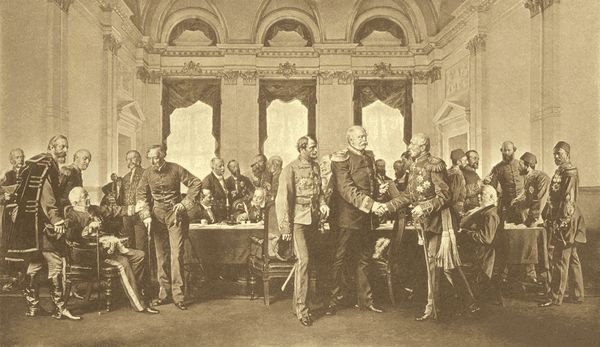| Berlin Conference in 1884 |
|---|
| www.studenthandouts.com ↣ World History ↣ Imperialism ↣ Imperialism Maps & Pictures |
 The Berlin Conference, held between November 15, 1884, and February 26, 1885, was a significant event in the history of colonialism, marking the formal beginning of the "Scramble for Africa." Organized by German Chancellor Otto von Bismarck, the conference aimed to regulate European colonization and trade in Africa during the New Imperialism period, ensuring that the competition for territory did not lead to conflict among European powers.
The Berlin Conference, held between November 15, 1884, and February 26, 1885, was a significant event in the history of colonialism, marking the formal beginning of the "Scramble for Africa." Organized by German Chancellor Otto von Bismarck, the conference aimed to regulate European colonization and trade in Africa during the New Imperialism period, ensuring that the competition for territory did not lead to conflict among European powers.The conference was attended by representatives from fourteen countries, including major European powers such as Britain, France, Germany, Portugal, and Belgium, as well as the United States. However, no African representatives were present, highlighting the colonial powers' disregard for African sovereignty and interests. One of the main outcomes of the Berlin Conference was the establishment of the principle of effective occupation. This principle required that a European power had to demonstrate effective control over an area before it could lay claim to it. This meant that merely making a claim on paper was not sufficient; the power had to establish an administrative presence and make agreements with local leaders. The conference also led to the creation of the Congo Free State, which was privately controlled by King Leopold II of Belgium. The territory, roughly the size of Western Europe, was intended to be a free trade zone, but it quickly became infamous for the brutal exploitation and atrocities committed under Leopold's regime. The Berlin Conference had far-reaching consequences for Africa. It formalized the partitioning of the continent among European powers, with little regard for existing ethnic, cultural, or political boundaries. This arbitrary division sowed the seeds for numerous conflicts and political issues that persist in Africa to this day. In addition to the immediate impacts on colonial administration, the conference also entrenched the imperialist ideology of the time, reinforcing the belief that European powers had the right to dominate and civilize supposedly "backward" regions. This Eurocentric worldview justified the exploitation and subjugation of African peoples and resources for decades. Overall, the Berlin Conference played a crucial role in shaping the geopolitical landscape of Africa and the dynamics of Western colonialism and imperialism, leaving a legacy that has continued to influence global politics and international relations well into the modern era. |
 |  |  |  |  |  |
| Imperialism Books and Films | Imperialism Outlines and PowerPoints |
| Imperialism Maps and Pictures | Imperialism Study Games |
| Imperialism Miscellany | Imperialism Worksheets |
| www.studenthandouts.com ↣ World History ↣ Imperialism ↣ Imperialism Maps & Pictures |








